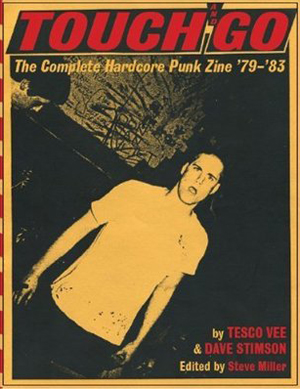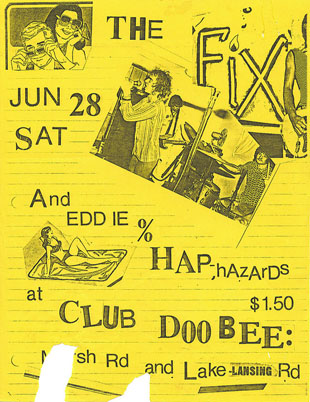"The year Touch And Go Magazine ran its last issue, I had just hit my teenage years in northern Colorado. I was listening to Cheap Trick and Pink Floyd on my Walkman as I trudged along my paper route in a foot of snow. Trading a couple of tapes with junior high school pals led to my discovery of what we then called "college rock". It was this discovery that led to my obsessive teenage self seeing the Minutemen open for R.E.M. in 1985. For me, that moment was the beginning of the end. Whatever punk and hardcore was selling at that moment, I’m still voraciously buying all these years later. By the late ‘80s, I had become a feverish cross-referencer. Seeing one name on the back of an album would send my pursuits in a million different directions. From my tiny bedroom, letters would be sent out to labels asking for catalogs and bands asking about tour dates."
What you just read was the first half of an essay I turned in to the folks behind the Touch & Go book last year. I’m publishing it here because, well, it was cut out of the book and it serves as a good jumping off point for Steve Miller. Apart from being the singer for The Fix and Blight back during T&G’s heyday, Steve was the editor of the behemoth literary feat that is the Touch & Go book. A cursory look of the T&G book will immediately make one realize the somewhat under-appreciated, yet unquestionably important, role Steve had.

Now, I had a pretty lengthy interview with Mr. Tesco Vee a little while past, but I feel so strongly about the book that has come out that I believe a Q&A with Mr. Miller is mandatory. So I sat down, cranked out some questions and little more than 48 hours later, my in-box was filled with answers.
Also, in honor of Steve’s involvement with the early hardcore scene and/or Touch & Go, I’m including a *gasp* radio broadcast of The Fix from Club Doo Bee in Lansing back in 1981 where they shared the stage with (fellow T&G’ers) The Necros.
So how did you fit in to T&G’s existence during the late 70’s and early 80’s?
We were a band that played music that the guys at T&G liked. We had known of them before The Fix started as wise ass locals with a little magazine that had some reviews of stuff we wanted to learn about. Then I met DS [Dave Stimson -ed] at the Census Bureau office, where we both worked in May 1980. The Fix was new and I invited DS to a party we were playing, where he was somewhat shocked that we were actually great. He spread the word to Tesco and in June we played some little room at the back of a restaurant and he loved it as well. By the end of the year, they wanted us to do a single for this thing they called a label. We were honored of course, and it gave the whole thing a great deal more direction. I mean, we had to wonder who the fuck would care about a record by us. But we weren’t going to refuse the opportunity. They believed in us as much as we did, although our reasons for existence were somewhat complex – we wanted to confront people with a sound that we heard in our heads that came running out our hands and hearts. And T&G understood it. You know, none of this means T&G was a rubber stamp for The Fix. DS berated us a couple of times. I think once was for his misplaced perception that we were too focused on appearance. And another time he mistakenly thought we might have been behind some head bashing at one of our increasingly infrequent live shows, as in our pals were conducting the stomping. Overall, we all got along well together and the book does a good job of following that.
How would you describe T&G in relation to the music scene and/or other zines/publications?
It was kind of the water tower. All things flowed from it in terms of serious local music, and its national role increased with every issue. There were others with similarly great ideas and a willingness to tell it straight up, like Your Flesh. There were other ‘zines that were simply boosters, like Ripper on the West Coast and the Big Takeover. None could carry the sense of humor that T&G had though. Tesco and DS were just plain funny.

Seeing as how The Fix only released a very limited amount of material, how powerful was T&G’s endorsement in print and subsequently releasing your two singles?
It meant a lot to us because we were not following the program at all and to be kind of the lone rangers meant that we had to be gratified by our own music. T&G embraced us and that meant we didn’t just have to look at each other and say, ‘hey, nice set.’ And people are followers by nature, so when T&G endorsed us, there were some who eventually felt it was okay to listen. That helped a lot. With the records, it was simply advertising in the magazine and they handed off some records to us. We didn’t know what to do. Hell, I think Mike and I each gave one to our moms, fer god’s sake. We just had no idea what to do with them. No one we knew really liked us. It wasn’t as if we had a cadre of punks hanging at The Fix house.
It seems like The Fix has a permanent place in the altar of hardcore. How do you react to that?
Cult band.
So between the early 80’s and, say, two years ago, were you still in pretty routine contact with TV and DS?
Tesco and I kept in touch over the years, especially when email came along. DS I hadn’t seen for years before running into him at a record show someplace in Maryland. I was living in Washington DC and had run onto people who told me he was around but it was a random meeting that got us together.
Whose idea was it to do a book? Who brought Ian Christe’s Bazillion Points imprint into the picture?
I had mentioned it to Tesco at some point when I moved back to Michigan in 2005 – I had been working for 14 years in Dallas and Washington D.C. – and so we decided to get a proposal together. We went to the local Kinko’s with a briefcase containing the original issues and went to town copying the best stuff, whatever we thought best represented the magazine. Then I wrote a proposal treatment with the ideas for essays, flyers and so on. We pitched it to a guy I knew who had a publishing house in California and he didn’t share our vision for a complete reissue, so we sat on it for a while. I subsequently put together a book proposal for a true crime book connected to a story I wrote for People magazine, and that sold quickly through a friend who served as agent, Chris Fuller. So I told him about the Touch & Go thing, and he loved it. So Fuller took it around and it was he who arrived at the doorstep of Bazillion Points. Smart guy for a lawyer.
As the editor of an anthology of T&G, what exactly were you doing for the project?
Reading, writing, encouraging, organizing, fixing, rinse, repeat.
As far as timelines go, when did you get involved in the book and how much time did it consume until it ended?
From the start to the end. In the middle there was considerable heavy lifting from the graphics guys, which I stayed out of. In the initial stages, before this book was ever sold, we would discuss layout and the dream scenario, which pretty much came true thanks to Ian Christe. At one point, maybe 2007, I took a bunch of different types of covers of books and laid them all out on a table at my place and asked Tesco to look and see what he liked best. He liked one very similar to what we have today.
In relation to the throwaway/disposable nature of current music journalism, how relevant/pertinent do you think a T&G book is?
A complete history, the intersection of Hustler, the New Testament and Circus. And those three are forever, right?
Describe what went through your mind once the book landed in your hands.
I have a poor capacity to enjoy the present and I regret that. I think I was wondering what was next. I did sort of smile when I ran my fingers over the lifted text on the cover. By the time something comes out, be it a record or a book, I am usually consumed by the next thing.
Although the book has only been out a couple weeks, what have the reactions/reviews been like?
Read ‘em and pause a happy pause. Takes one second then it’s gone. Always good to see something worthwhile appreciated, since the good shit gets ignored too frequently.
Has it already exceeded your expectations? Did you even have any expectations?
I had no expectations, never once wondered how it would be received. Sort of like making music; you’re gonna make it no matter what, because you have to. And it’s cool if someone likes it. And if they don’t it’s fine because you did what you had to do.

The Fix – Live at Club Doo Bee 1981
